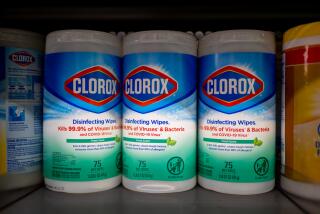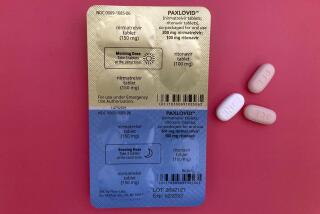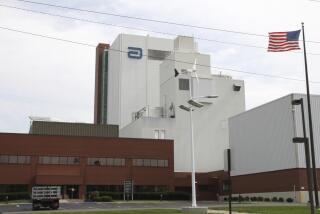Flu Vaccine Factory Shutdown Extended
Regulators in Britain extended the shutdown of Chiron Corp.’s flu vaccine factory for three more months on Tuesday, heightening concern about another vaccine shortage next year.
The Medicines and Healthcare Products Regulatory Agency said it was suspending the license of Chiron’s Liverpool factory until early April. In that case, Chiron wouldn’t be able to supply flu shots to the U.S. until November.
Another British agency, the Department of Health, said the extension was intended to give Chiron time to take remedial action at the troubled plant and that its action wasn’t the result of new findings.
Chiron has four weeks to appeal the decision, but the company said Tuesday that it did not plan to do so.
On Oct. 5, British authorities closed the Liverpool plant for three months because they had found bacterial contamination in the vaccine. That cut the U.S. vaccine supply in half, causing public health authorities to ration scarce shots. The initial suspension ends Jan. 5.
The Emeryville, Calif.-based company is under investigation by the Justice Department for possibly misleading the government or investors about its ability to provide flu vaccine. It also faces an inquiry from the Securities and Exchange Commission and several shareholder lawsuits.
A Food and Drug Administration spokeswoman said the agency had been aware that its counterpart in Britain planned to extend the shutdown of the Liverpool plant, adding that the extent of the work required there was “not insignificant.”
She said it was too early to predict whether Chiron would be able to supply vaccine in 2005. “At this point, we’re still hopeful.”
Chiron’s suspension can be reversed whenever the company shows it has fixed its production problems in Liverpool.
On Wall Street, analysts were pessimistic. Geoffrey Porges of Sanford Bernstein & Co. said most flu vaccine manufacturers begin shipping shots to clinics and hospitals in July. He doubted that Chiron would find buyers for its vaccine in November.
“The company should clear the air on this and say they’ll be out of the business for the next eight or nine months,” Porges said. “They should sterilize the facility, remedy all the [manufacturing] violations and come back in the business” in 2006.
Chiron had expected to supply 52 million doses to the U.S. this year but was derailed by contamination problems at the plant. Inspection reports turned over to Congress showed that regulators found unsanitary practices at key points in the vaccine production process, and bacteria in batches of vaccine.
News of Chiron’s added difficulties came as U.S. public health officials said they had arranged to buy 1.2 million doses of flu vaccine from a foreign supplier to ease the shortage. The FDA said it had determined that the vaccine from British drug maker GlaxoSmithKline was safe for use.
The U.S. could ultimately obtain 4 million doses of extra vaccine from Glaxo, Health and Human Services Secretary Tommy G. Thompson said. It is the first such agreement that U.S. officials have reached to accept flu vaccine from a non-licensed supplier in response to this year’s supply disruption.
The Glaxo deal brings the total U.S. supply this flu season to 62 million, compared with an anticipated 100 million before Chiron’s crisis. Besides Chiron, Aventis Pasteur Inc., a French firm, is the only other provider of flu shots licensed in the U.S.
Health and Human Services officials said they approved the Glaxo vaccine after extensive analysis by the FDA, including an inspection of the factory in Dresden, Germany.
“I am very pleased with this scenario,” Thompson said at a news conference. “It will allow us to get more vaccine in the hands of those who need it most.”
The FDA approved Glaxo’s vaccine only for this flu season. However, Wall Street believes public health authorities will try to persuade Glaxo to supply vaccine next year, particularly if Chiron does not resolve its problems soon. Merrill Lynch analyst Eric Ende has estimated that Glaxo could provide 10 million to 20 million doses of flu vaccine in 2005.
The FDA spokeswoman wouldn’t comment on any discussions between the agency and Glaxo. However, she said the FDA was in talks with a possible vaccine supplier for next year.
More to Read
Inside the business of entertainment
The Wide Shot brings you news, analysis and insights on everything from streaming wars to production — and what it all means for the future.
You may occasionally receive promotional content from the Los Angeles Times.









